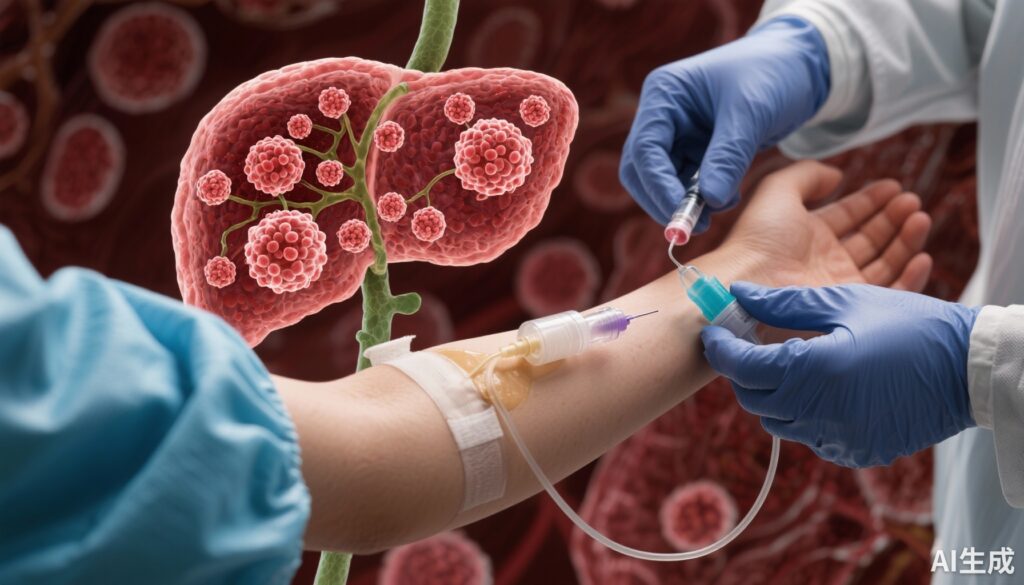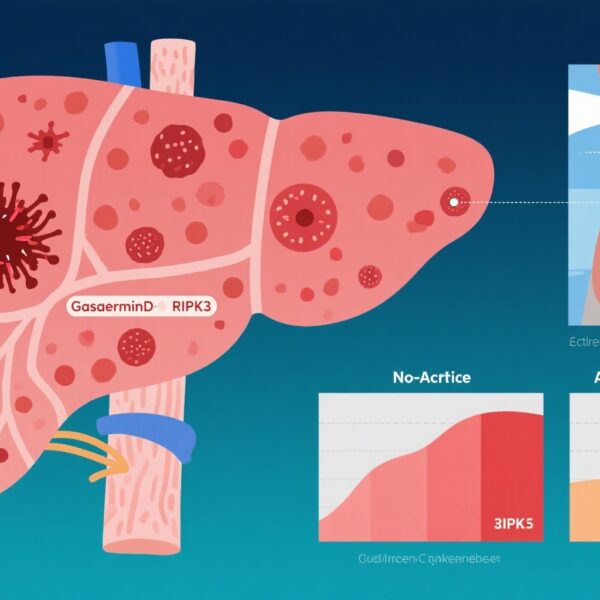Highlight
• ADP-A2AFP is a first-in-human affinity-enhanced T-cell receptor therapy targeting AFP in advanced hepatocellular and gastric hepatoid carcinoma.
• Treatment involved lymphodepletion chemotherapy followed by infusion of engineered TCR T cells.
• Safety profile was manageable with cytokine release syndrome occurring mainly at low grades.
• Preliminary efficacy included complete and partial responses, with infiltration of engineered T cells observed in tumor tissue.
• Dose correlates with serum AFP reduction, supporting a biologic on-target effect.
Study Background
Advanced hepatocellular carcinoma (HCC) remains a challenging malignancy with poor prognoses despite current systemic therapies such as sorafenib, lenvatinib, and immune checkpoint inhibitors. AFP (alpha-fetoprotein), a fetal antigen commonly overexpressed in HCC and certain gastric hepatoid carcinomas, presents a potential tumor-specific target for adoptive T-cell therapies. Novel immunotherapies designed to redirect T cells against AFP-expressing tumor cells may offer a new therapeutic avenue where standard treatments have limited benefit, underscoring an unmet clinical need in this population.
Study Design and Methods
This phase I open-label, single-arm clinical trial (NCT03132792) enrolled adult participants who were human leukocyte antigen (HLA) eligible and had advanced AFP-positive hepatocellular or gastric hepatoid carcinoma not suitable for transplant or resection. Patients had either progressed on, were intolerant to, or refused prior systemic therapy. Participants underwent lymphodepletion chemotherapy regimens with cyclophosphamide and fludarabine to create a hospitable environment for adoptively transferred T cells. Following lymphodepletion, ADP-A2AFP, an autologous T-cell therapy engineered with an affinity-enhanced T-cell receptor directed against AFP, was administered intravenously. The primary objective was to evaluate safety; key secondary endpoints included clinical response assessed by RECIST v1.1 criteria.
Key Findings
Twenty-one patients received at least one dose of ADP-A2AFP, with 20 having HCC and 1 with gastric hepatoid carcinoma. All patients experienced at least one grade 3 or higher adverse event. Notably, grade ≥3 events related to the study treatment occurred in about 52.4% of patients. Cytokine release syndrome (CRS), a common toxicity of T-cell therapies, was observed in six patients: five had mild to moderate CRS (grades 1-2), while one experienced a severe grade 4 episode. There were no treatment-related deaths reported.
The best overall responses included one complete response and one partial response, resulting in an overall response rate (ORR) of 9.5%. Stable disease was achieved in 12 patients, with eight maintaining stable disease for 16 weeks or longer. These findings indicate a disease control rate of over 60%, which is promising in this heavily pretreated population. Tumor biopsy analyses post-treatment demonstrated infiltration by ADP-A2AFP TCR T cells and endogenous CD8+ T cells localized specifically to AFP-expressing tumor regions, indicating effective tumor targeting and potential immune activation within the tumor microenvironment.
Additionally, data showed a dose-dependent relationship between ADP-A2AFP infusion levels and serum AFP reduction in responders, suggesting on-target antitumor activity and biologic plausibility of the therapeutic mechanism.
Expert Commentary
ADP-A2AFP represents a translational advancement in adoptive immunotherapy for AFP-positive malignancies, a niche with significant unmet needs. The safety profile aligns with expectations for TCR-engineered T-cell therapies, with manageable CRS and hematologic toxicities typical of lymphodepletion regimens. The observed tumor responses, including a complete remission in a patient with advanced disease, underscore the potential of affinity-enhanced TCR T cells to overcome immune evasion mechanisms characteristic of solid tumors such as HCC.
However, response rates remain modest and warrant further optimization, including patients’ selection, TCR affinity tuning, and combinational strategies to enhance efficacy and durability. The trial’s limitations include its small sample size, single-arm design, and heterogeneity regarding prior therapies. Also, long-term follow-up is needed to assess durability of responses and late toxicities.
Conclusion
This first-in-human phase I study demonstrates that ADP-A2AFP TCR T-cell therapy is feasible, has an acceptable safety profile, and shows preliminary signs of antitumor activity in advanced hepatocellular and gastric hepatoid carcinoma patients refractory to standard care. The infiltration of engineered T cells into AFP-expressing tumor tissue and correlation of dose with biomarker response provide encouraging biologic validation. These findings support further clinical development and optimization of AFP-targeted adoptive T-cell therapies as a novel treatment approach for advanced HCC and related malignancies.
Funding and Trial Registration
The study was registered under ClinicalTrials.gov identifier NCT03132792 and first posted on April 8, 2017. Funding sources are not detailed in the referenced publication.
References
Meyer T, Finn RS, Borad M, et al. Phase I trial of ADP-A2AFP TCR T-cell therapy in patients with advanced hepatocellular or gastric hepatoid carcinoma. J Hepatol. 2025 Aug 12:S0168-8278(25)02404-3. doi: 10.1016/j.jhep.2025.07.033. Epub ahead of print. PMID: 40812667.



